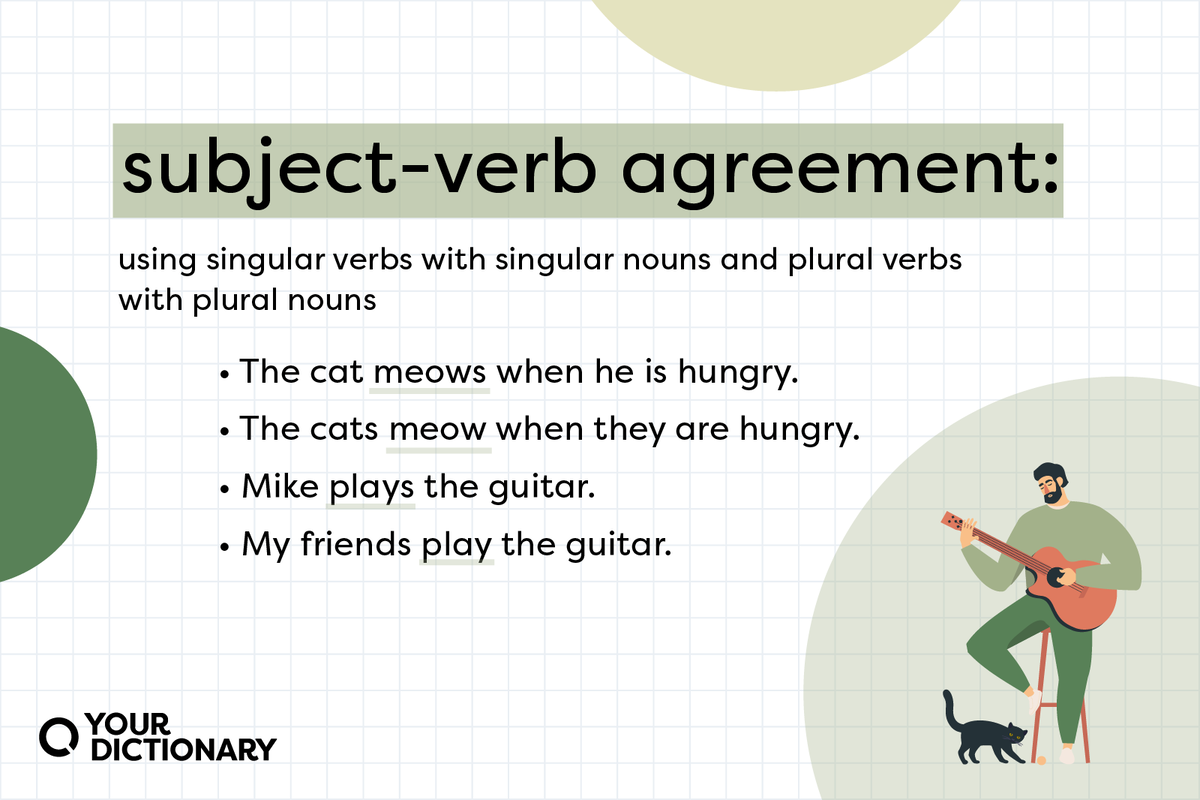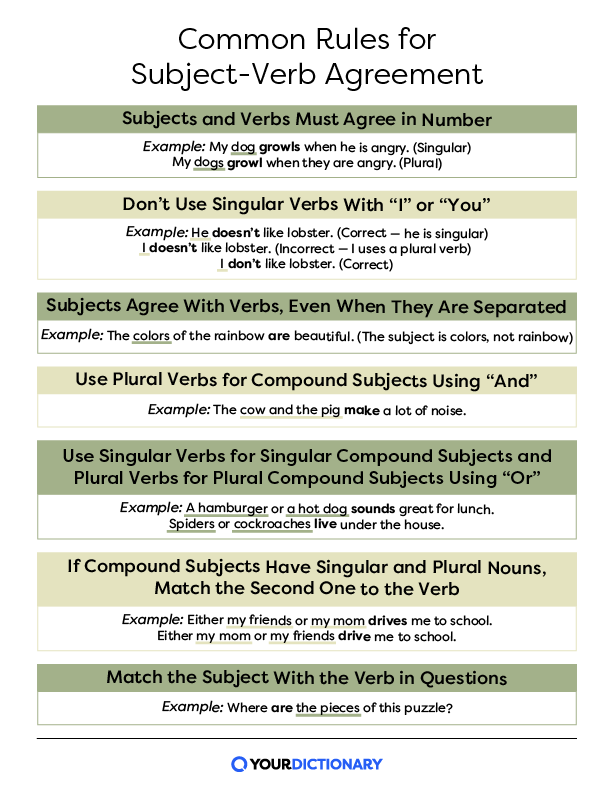Subject-Verb Agreement Rules, Simplified

You might think that subject-verb agreement would be pretty simple. However, it can get quite tricky depending on the complexity of the sentence. Learn the subject-verb agreement rules through several examples. Use a colorful printable to help them stick in your mind.
In this article
What Is Subject-Verb Agreement?
Subject-verb agreement means that you’re using singular verbs with singular nouns and plural verbs with plural nouns. The verbs then “agree” with the subject of the sentence, which can be a noun or a pronoun.
- Mike plays the guitar.
(Mike is singular, plays is singular)
- My friends play the guitar.
(My friends is plural, play is plural)
- She laughs at everything.
(She is singular, laughs is singular)
- They laugh at everything.
(They is plural, laugh is plural)
What Are the Rules of Subject-Verb Agreement?
Most times, you can tell if a sentence has proper subject-verb agreement by reading it out loud. “The children laughs at the clown” doesn’t sound correct to English speakers, so the subject-verb agreement error is easy to spot and fix.
However, there are specific subject-verb agreement rules to follow in case the answer isn’t obvious in a specific sentence.

DESCRIPTION
Chart of common rules for subject-verb agreement
Created by YourDictionary
PERMISSION
Owned by YourDictionary, copyright YourDictionary
Subjects and Verbs Must Agree in Number
Singular subjects, specifically third-person singular nouns and pronouns (he, she, it), get singular verbs. Everything else gets plural verbs.
- My doggrowls when he is angry.
(Singular)
- My dogsgrowl when they are angry.
(Plural)
- Shedoesn’t like watermelon.
(Singular)
- Theydon’t like watermelon.
(Plural)
Advertisement
Don’t Use Singular Verbs With “I” or “You”
Even though the pronouns I and you are singular, they don’t agree with singular verbs. Make sure you conjugate first and second-person sentences correctly as well.
- Hedoesn’t like lobster. (Correct — he is singular)
- Idoesn’t like lobster. (Incorrect — I uses a plural verb)
- Idon’t like lobster. (Correct)
- Shehas a beautiful home. (Correct — she is singular)
- Youhas a beautiful home. (Incorrect — you uses a plural verb)
- Youhave a beautiful home. (Correct)
Subjects Agree With Verbs, Even When They Are Separated
When phrases or clauses come between the subject and verb, don’t make the last word of the phrase agree with the verb. Find the actual subject of the sentence (which might be far from the verb) to follow subject-verb agreement.
- People who live in Wisconsin are used to cold weather.
(The subject is people, not Wisconsin)
- The colors of the rainbow are beautiful.
(The subject is colors, not rainbow)
Advertisement
Use Plural Verbs for Compound Subjects Using “And”
Treat compound subjects as plural nouns, and use plural verbs for subject-verb agreement.
- The cow and the pigmake a lot of noise.
- Billy and Jakego to the same school.
Use Singular Verbs for Singular Compound Subjects Using “Or”
If singular subjects are connected by the conjunctions or, neither/nor, or either/or, the verb is singular. (Try to remove one subject and see if the verb still works.)
- A hamburger or a hot dogsounds great for lunch.
- Either Jessica or Christiandrives a Toyota.
- Neither my mom nor my dadwants to go to the movies.
Use Plural Verbs For Plural Compound Subjects Using “Or”
If subjects connected by or, neither/nor, or either/or are both plural, the verb is also plural. (Same rule as above — remove one subject and see if it works.)
- Spiders or cockroacheslive under the house.
- Either my sisters or my cousinsbring soda to the party.
- Neither our team nor our rival teamlike to play in the rain.



